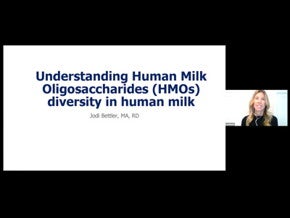
Article
Bovine milk oligosaccharides in infant formula improves stooling pattern and sleeping episodes
Gut health
3 min read
Study design
- Double-blind, parallel-group, randomized controlled trial of healthy, term infants in Philippines
Subject and Intervention
Control group (n = 112),
- Fed an intact-protein, bovine milk-based, whey-predominant, alpha-lactalbumin-enriched term infant formula with 13.4 g/L protein and 45% high sn-2 palmitate fat blend
Test group (n = 114),
- Fed a formula identical to control formula except for a total 7.2 g/L supplementation of bovine-milk derived oligosaccharides (MOS)
Study duration
- Baseline (21-26 days) to 6 months of age
- Clinic visits were conducted at enrolment, 1.5 month, 2.5 month, 4 and 6 months
- Phone calls were conducted midway between clinical visits and 14 days after 6-month visit
Results
Growth,
- Both groups followed the median of WHO growth standards for z-scores for weight-for-age, length-for-age, head circumference-for-age, and BMI-for-age throughout the 6 months
- No significant differences were observed in any z-scores between groups at any visits
Stool consistency,
- At post-enrollment timepoints, test group had significantly lower mean stool consistency (i.e. softer stools) than control (p < 0.001 for 2.5- and 4-month visits; p < 0.005 for 6-month visit);
- Test group had significantly fewer parental reports of harder stools than control (OR = 0.32, 95% CI: 0.20, 0.49, p < 0.0001);
Gastrointestinal tolerance,
- Test group had significantly reduced difficulties in passing stool than control (OR = 0.25, 95% CI: 0.09, 0.65, p = 0.005);
- No significant differences were observed between groups in parent-reported incidences of spitting-up/vomiting, flatulence, and fussiness caused by flatulence;
- Test group had significantly lower overall incidence of sleeping episodes (IRR = 0.95, 95% CI: 0.91-0.99, p = 0.023);
Parent-reported and physician-reported adverse events (AE),
- The overall number of infants with at least one AE report was similar in both groups;
- In these infants, 99.5% of control group and 100% of test group had AEs unrelated to study feedings;
Conclusion
- MOS-supplementation in infant formula is safe and well-tolerated, supports normal infant growth and improves stooling pattern without increasing parent-reported and physician-confirmed adverse events.
Link to publication:
https://pubmed.ncbi.nlm.nih.gov/33958719/
WYE-EM-078-MAY-21
Reference
Estorninos E et al. Infant formula containing bovine milk-derived oligosaccharides supports age-appropriate growth and improves stooling pattern. Pediatric Research. 2021;doi:10.1038/s41390-021-01541-3. Online ahead of print.
Other articles that you might be interested in:
[Literature Library] Structures and metabolic properties of bovine milk oligosaccharides (BMOs)
If you liked this post you may also like


![[Literature Library] Epitope-Specific Response of Human Milk sIgA in COVID-19 Recovered Women](/sites/default/files/styles/card_m_carousel_mobile/public/2021-07/205_COVID-opt.jpg?itok=YPO7jIYg)
